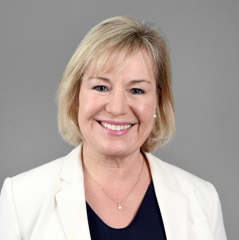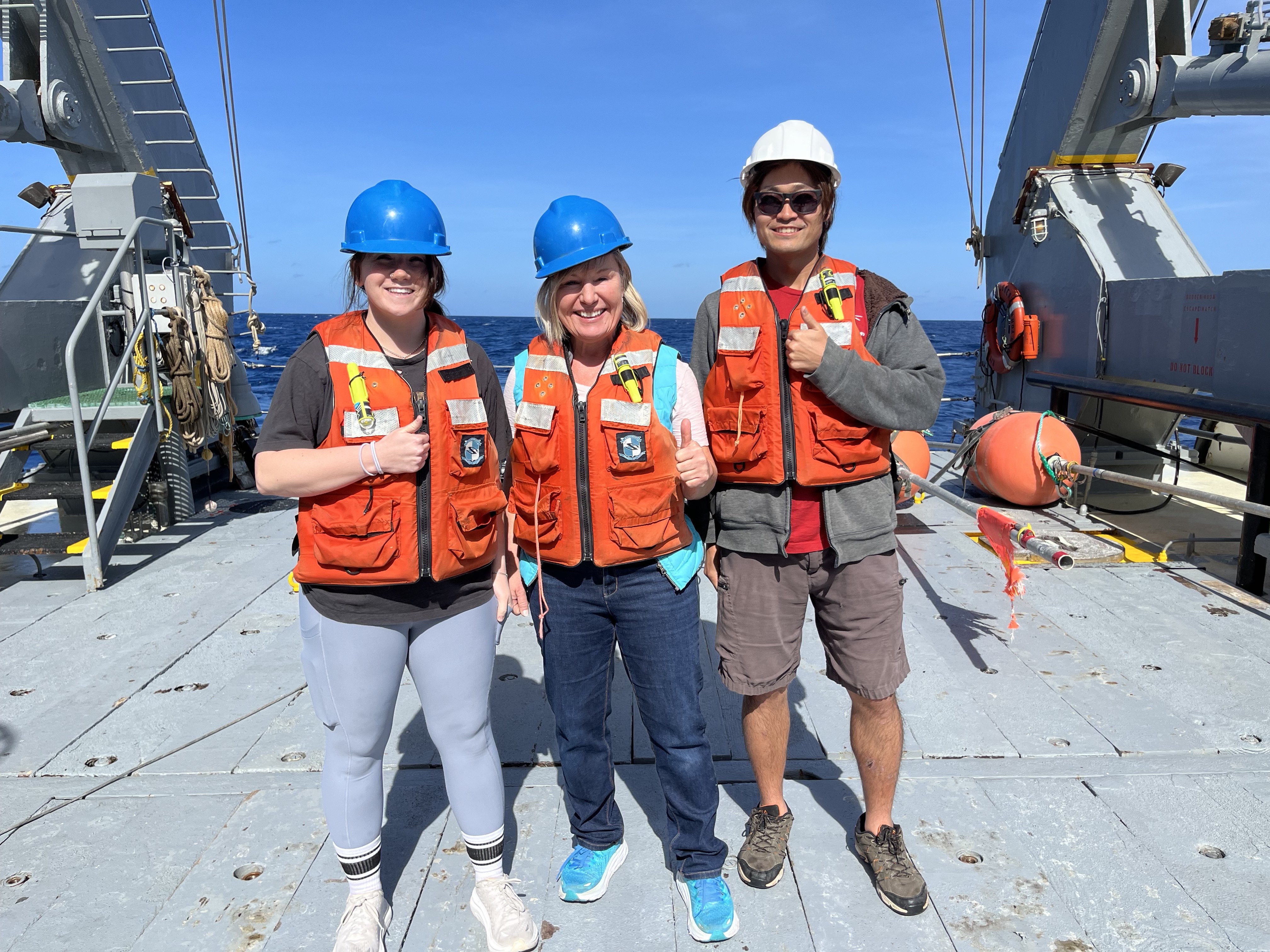Since childhood, Susanne Neuer has been fascinated with the mysteries under the sea.
As a kid, summers were spent exploring Mediterranean waters with her family; as a teen, she picked up jobs to buy a microscope and examine the microscopic organisms in ponds near her home; and as an academic, she’s advanced crucial phytoplankton research around the world, deepening the understanding of the vital role tiny sea organisms play in preserving ocean health and human livelihoods.
“My love for the ocean and my interest in plankton has shaped my desire to become an oceanographer and my career path ever since,” said Neuer, director of Arizona State University’s School of Ocean Futures.
At the helm of ASU’s highest oceanic post, Neuer oversees the ocean discovery and research initiatives spanning three campuses and two oceans, dozens of faculty members, students, staff, a fleet of undersea drones in Bermuda, an airborne observatory in Hawaii and labs in Arizona that will be growing coral.
ASU News spoke to Neuer about her love for the ocean, the future of ocean research in the face of climate change, and why a renewed focus on ocean health is important for everyone — even if you live in the desert.
Note: This interview has been edited for clarity and brevity.

Susanne Neuer
Question: What first compelled you to get involved in ocean research?
Answer: My passion for studying the oceans goes back to when I was a child. My parents would take me and my brother to the island of Ibiza in the Mediterranean where we discovered the underwater world, which has fascinated me ever since.
Then back home in southern Germany, I discovered aquatic life in nearby ponds. For some reason, I became interested in plankton life and studying small crustaceans and microscopic algae. First, I used a microscope I assembled from a kit that I got for Christmas, but then I bought a better scope with money saved up from a summer job in a flower shop.
Q: Why is ocean research necessary? And why is it important for someone living in the desert to care about ocean health?
A: Our lives are so closely intertwined with the ocean, even though we do not experience a coastline in Arizona. Simply, life here would not be possible without the ocean.
Through the absorbance of heat and its distribution from low to high latitudes through currents, the ocean makes this a livable planet. Without it, we would have extreme day-night differences in temperature, somewhat like the desert planet Mars. The minuscule algae in the ocean are also the basis of our oceans’ food web, from planktonic crustaceans all the way up to whales, and they produce about half of the oxygen through the photosynthesis that we breathe; the other half comes from land plants. And all the rain that falls in Arizona and enables us to live in this desert originates from evaporated moisture that comes to us from the Pacific, the Gulf of California or Gulf of Mexico, depending on the season.
The ocean takes up a quarter to a third of all CO2 emissions that we emit into the atmosphere every year by fossil carbon emissions. Without this important ocean service, our CO2 levels would be much higher and our planet warmer. This affects us anywhere on the earth, whether we live in the desert of Arizona or near a beach.
Q: What are some pressing issues or threats the oceans face today?
A: The oceans are affected by a myriad of changes that are mainly caused by human activities. The increasing CO2 uptake I mentioned causes the oceans to become more acidic. Our oceans are warming, and the heat makes the ocean water expand, causing sea-level rise. Melting ice sheets and glaciers can cause even more global sea level rise. Extremes in weather affect people from coastlines to far inland. Overfishing of the oceans has removed valuable top predators, causing us to "fish down the food web" that seriously affects the diversity of sea life and its natural abundance. Some think oceans are already in collapse. There is great urgency to act.
Q: What can or should be done to combat these challenges?
A: ASU is working on many fronts. We have faculty and researchers monitoring coral health (in) coastal ecosystems; we’re working with native communities and finding common solutions that are in harmony with nature; we’re researching coral bleaching, advancing the understanding and monitoring of changing ocean chemistry, working on the front lines to combat overfishing, and working with policymakers to find sustainable solutions to marine conservation. An additional focus is teaching and educating (the) public and K–12 schools with hands-on learning through our Ocean Academy and experiential learning opportunities.

Susanne Neuer (center) with ASU students aboard ASU's Atlantic Explorer in March 2023. Photo courtesy Susanne Neuer
Q: What role do interdisciplinary collaborations and partnerships with local communities play in understanding ocean health and advancing solutions?
A: We are very fortunate to have among our faculty several scientists that are native Hawaiians and embedded in this land-ocean-people connection. We have learned how important it is to work with local communities to find solutions that serve people and integrate their wisdom into the way we study and teach about the ocean.
Q: What unique perspective do you believe ASU has on ocean research where seemingly two contrasting environments are at play — the arid desert landscape and the vast ocean?
A: This is a strength. Our main (headquarters) in Tempe is located in the Walton Center for Planetary Health, not by accident. Indeed, our strength lies in our faculty on the three campuses, and that we combine knowledge, inquiry, learning and teaching across the two major oceans of our planet, which drive the majority of climate on Earth, contain most of the life and are a beacon for finding solutions to our oceans' crises.
We combine different perspectives and experiences and teach each other how to work on coastal and coral ecosystems, closely aligned and integrated with people’s culture and wisdom. And we have two major vessels that are integral to the monitoring of both ocean ecosystems: The RV Atlantic Explorer at BIOS and the Airborne Observatory in Hawaii.
Q: In a changing climate with growing threats, what is your hope for the future of ocean research?
A: My hope is that we will arrive at meaningful solutions for our crises. We need people who are ocean-literate and understand climate change and how it affects the oceans, coastal regions and people living there, the ocean services that enable us to live comfortably on our planet, and importantly, how ocean life suffers from unsustainable exploitation and pollution.
We need to find solutions and we have to all work together – scientists, engineers, educators, practitioners and policymakers. This is our call. While conducting solutions-based and forward-looking research, we need to educate the next generation. Our school, embedded in the Global Futures Lab, is uniquely equipped to work across disciplines — from learning to discovery to finding solutions.
Top photo courtesy of Unsplash.
More Environment and sustainability

Sustainable food systems students tackle agriculture challenges at Model USDA event
As the nation faces growing challenges around food production and security, it is crucial to prepare students to be the future leaders that will navigate the complex policy decisions shaping the…

Arctic ‘deep water’ is surprisingly well protected against climate change — for now
The deep recesses of the Arctic Ocean are remarkably stable, despite how rapidly ice is melting on the surface.New research led by Arizona State University scientists reveals that the same pool…

ASU, SRP project takes flight to improve water supply forecasting
Arizona State University and Salt River Project are working with Airborne Snow Observatories Inc. on an innovative project to measure snowpack in the Salt River watershed — providing crucial data to…
